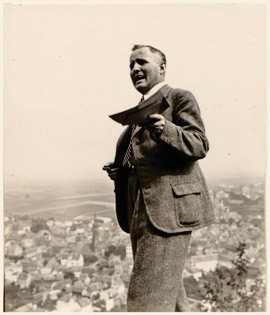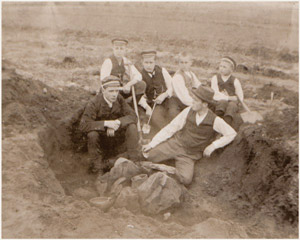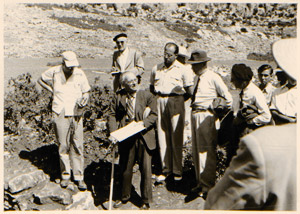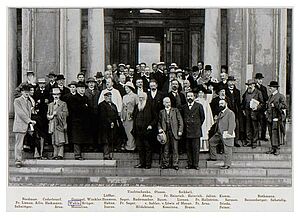Curriculum Vitae

Ernst Wahle is one of the best known and most eminent German prehistorians of the 20th century. He owes his international reputation to his academic publication Zur ethnischen Deutung frühgeschichtlicher Kulturprovinzen (« On the ethnic interpretation of prehistoric cultural provinces »), published in 1941, in which he demonstrated for the first time and on a broad basis that transformation of settlement structures can take place without manifesting itself in archaeological finds and, inversely, that the change of finds not necessarily points to an alteration in settlement. This result is of considerable importance, because it reveals that the identification – widely believed in the field of European prehistoric research – of archaeological cultures with a certain people involves significant methodological problems.
Ernst Wahle was born May 25, 1889 in Magdeburg and he spent his childhood and youth in the Prussian province. He undertook his first archaeological excavations while he was still a pupil. So it was for this reason that he took up prehistory as his profession – not an easy decision to make considering that study opportunities were hardly available at the beginning of the 20th century. After a short study visit to Halle, he left for Berlin to Gustaf Kossinna (1858-1931) in 1908. Though controversial due to personal and scientific reasons, Kossinna was one of the most striking figures in prehistoric research within Europe at that time. The publication cited above reveals a dash of critical distance towards the theses of his former academic teacher.

Wahle changed again his place of study and arrived in Heidelberg, where he stayed the rest of his life. In 1913 he completed his doctoral degree with the geographer Alfred Hettner (1859-1941). He submitted a graduate thesis in which he related archaeological aspects to those relevant for geographic habitat. After mainly serving at the Western Front during World War I he returned to Heidelberg where he devoted his work to the municipal collections before he took up the post of Regional Curator for Archaeology and as lecturer at the University in 1922.
In 1924 he achieved the title of professor, which didn't led to a permanent appointment as University professor until 1937. He lectured at University and managed the Institute for Pre- and Protohistory. He died January 21, 1981 at Heidelberg.
Like many other German prehistorians Wahle joined NSDAP in 1937 – presumably less because of conviction but of opportunism. The real reasons which led himself for to reach this decision aren't distinguishable; however we suppose a connection with his professional position which was uncertain for a long lime. Like a number of colleagues he expected support on the part of the Nazis to advantage his discipline. However, his intellectual views rapidly brought him in opposition to the regime of the Third Reich. The theory that the origins of the Indo-Europeans should be fixed in the East particularly provoked the hostility of the Nazi ideologists who saw that as an attack on the idea of a « Nordic race ».

Amongst other German prehistorians Wahle was one of the first who maintained a so-called « landscape archaeology », which means to take account of all archaeological environmental factors related to prehistoric population and interaction between habitation and natural environment. His whole life long Wahle opposed research which focused mainly on typology- and chronology-building of archaeological finds. Whereas this position was not taken well by his German colleagues, he defended on his part the study of prehistory as a historical science, to be understood as cultural history as well as political history. Another focus of his research was the history of the prehistoric discipline itself, in terms of studying the reception of prehistory from the 16th century onwards and analysing its contribution to the formation of a national consciousness, not least with regard to the "late" nations.

After his death his bequest was transferred to the Heidelberg Institute of Pre- and Protohistory and then - in 1984 - to the University Library of Heidelberg. Apart from remarkable working material on different subjects Wahle dealed with, his archive comprises some of his professional and scientific correspondence. This reflects the history of the discipline of prehistory in Germany in the first half of the 20th century to which Wahle actively contributed and in which he participated. He corresponded not only with almost all of his German colleagues but also with numerous European prehistorians like Johannes Brøndstedt, Walter U. Guyan, Christopher Hawkes, Rudolf Laur-Belart, Oswald Menghin, Sophus Müller or Otto Rydbeck. The bequest was completely indexed from 2010-2012 and is now available for online research.
Christian Gildhoff (Translation: Anette Philipp)



